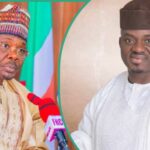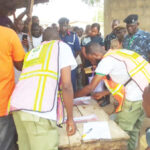Even as the 2023 Presidential polls exercise has been conducted with controversies trailing its outcome, and the announcement of the candidate of the ruling All Progressives Congress (APC) Bola Tinubu as winner, older Nigerians may not fail to see striking semblances and contrasts between it and the earlier, iconic June 12 1993 affair, which held 30 years ago.
And while such meeting points and deviations may go unnoticed by many, the lessons they offer are legion. From the build up to the actual voting and post-election drama, both exercises provided enough cause for concern over the future of the country. The main difference for now seems to be that while in 1993 the presumed winner was not formally announced and the results were annulled, in the 2023 exercise the results and winner nave been announced in other to render it a concluded matter, at least for now.
For the benefit of latter day Nigerians, to whom June 12,1993 polls may have been sold as a reference point, it is by providence that a wide cross section of them are witnessing the 2023 polls with mixed feelings, some in disappointment, others in jubilation – party affiliation notwithstanding. This is perhaps just as their elders were treated 30 years ago. Both polls exercises offered the country great expectations but ended up as anti-climaxes, with dashed hopes.
Like the 1993 exercise, what the 2023 polls had offered Nigerians was not just the victory of any particular individual or political party, but that the country would upgrade its electoral culture and fortunes. In 1993 it was the resort to more democratic ethos, including the introduction of the iconic Option A4 campaign strategy which ensured that every nook and corner of the country was mobilised to participate in the polls in order to guarantee a truly general elections. In the 2023 version, the election management process was upped with the introduction of the new Electoral Act 2022, which offered as its unique selling point, a complement of ICT driven protocols that have the BVAS as the talisman. BVAS remains the key to the statute-defined upload of election results directly from the polling unit level.
Street hawking and its effects on children
But from the conduct of the polls, that seems not to have been achieved, at least in every polling unit. From the avalanche of protests trailing the polls exercise, the BVAS was not generally allowed to deliver on its mandate. As was beamed live to Nigerians and the international audience, a significant percentage of the election results were read from manually compiled record sheets. This had led to protests by several political parties and interests, with the challenge of having the courts to intervene once more to decide on what the general public may not have been allowed to resolve, through the ballot box.
In a similar fashion the June 12 1993 general election exercise which was conducted by the administration of General Ibrahim Babangida, had offered Nigeria a new beginning from the ravages of military incursions into governance. Among the similarities between it and the current one is the feature of a Muslim – Muslim presidential ticket in the persons of Moshood Abiola for president with Babagana Kingibe as his running mate on the Social Democratic Party (SDP) platform. On the opposition side Bashir Tofa was the presidential candidate and Sylvester Ugoh a southern Christian was the running mate for the National Republican Convention (NRC) platform. As events turned out, Abiola and his vice presidential candidate Kingibe presumably won the polls. In 2023, Bola Tinubu and Kashim Shetima of the APC – both Muslims, have been declared victorious.
Another similarity was in the build-up to the two polls exercises. In 1993, the polls offered significant promise of changing the country which was smarting from the vagaries of military rule and was ready for any change by whatever sacrifice even if it was through an imperfect electoral process. Hence Nigerians accepted the imposition of diarchy which featured military executive leadership that was super-imposed on a democratically elected legislature at both federal and state tiers of governance. With such unwieldy seed of implosion so embedded in the fabric of governance, it was a matter of time before the inherent incongruities manifested, and the June 12 crisis came to be. The reverberations from that dispensation eventually led to the reinvention of the country and birthed the new Fourth Republic in1999.
Another similarity was that 1993 polls was the first at which technology – even at the rudimentary stage was introduced through the intervention of the cell phone.(090…). While the government was dilly dallying with manual processes of collation of election results, the political parties deployed the cell phone to collate results and were ahead of the government. Hence while the government was waiting for the official results from NEC, the Abiola group had used the phone to collate results outside the government circles, to establish the basis of his claims to have won the polls. In fact it was widely believed that the discrepancy between the official results and the privately collated figures, constituted the trigger for the annulment of the polls results by the Babangida regime.
This author recalls vividly when in the heat of the long wait for the polls result on Sunday June 13 1993, Mr Tony Iredia the spokesman to the electoral umpire FEC repeatedly warned the media not to announce any result outside his personal release. However, by 6:00 pm the BBC news broadcast announced that Bashir Tofa had lost Kano State and cited its Nigerian correspondent Charles Aniagolu as the source of the story.
That was the trigger every newspaper and radio station in Nigeria needed to launch the mega story of the June 12 drama in its own way. By Monday June 14, 1993, virtually all newspaper across the country led with the news.
The circumstances of Tofa losing Kano State was near apocalyptic enough under the political atmosphere at that time. Bashir Tofa the candidate for the NRC, and hailed from Kano State. A northern Muslim, had picked a Southern Christian vice presidential candidate, in order to provide the so desired political balance. Of all places he could have lost Kano was a long shot. Hence when it was announced that he lost Kano state, it was a simple guess that Abiola would win the polls.
In the 2023 polls, the same intervention by technology was also witnessed, this time at two levels while the official side featured the now controversial BVAS, it would seem the INEC never reckoned with the capacity of the political parties to deploy surveillance efforts through alternative technologies comprising the ubiquitous social media and other techniques to collate results outside the enterprise of the INEC. Hence while INEC may be citing its challenges with the BVAS, there are in the custody of members of the pubic actual results that may be at variance with INEC versions. This is where the end game of the 2023 presidential polls stands right now.
And as the parties and candidates head for the courts, over the polls results, this is a simple prayer that may the best man eventually win the race.

 Join Daily Trust WhatsApp Community For Quick Access To News and Happenings Around You.
Join Daily Trust WhatsApp Community For Quick Access To News and Happenings Around You.


